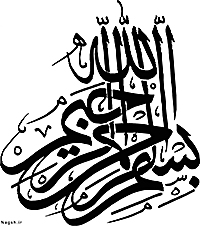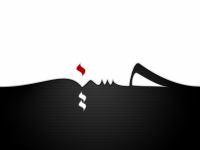Mourning … Part 7
- Created by bineshan on 01 Dec 2016
- Categories: Articles Imam Hossain
Mourning …
Part 7
5) Mourning for Prophet Mohammad (SAWA)
The following is a sample of what has remained in the Sunni documents in this regard:
After the burial of the Prophet (s.a.w.a.), the companions in a state of sorrow were virtually throwing dust over themselves, and were crying due to the separation from their beloved. Especially Hazrat Faatemah (S.A.) was inconsolable; she was looking at the faces of her sons Imam Hasan (A.S.) and Imam Husain (A.S.) and was crying at their plight and her own plight. Even Aaesha was continuously crying and wailing. For several days and nights the voices of crying and mourning rose from this house which became house of grief (Baytul Huzn) and separation. (the sunni Madaarij al-Nubuwwah, vol 2, pg. 753-754)
Mourning in the Sunnah of the Prophet (SAWA) according to Sunni documents
In the Sunnah of the loving Prophet (SAWA) mourning and crying for the deceased ones and visiting the graves were significant; here we shall mention only three cases as recorded in the Sunni documents:
1) Mourning for Hadrat Hamzah, the Prophet’s uncle (SBUT)
Hadrat Hamzah (SBUT) in the battle of Ohod was martyred at the hand of polytheists; Hind, the wife of AbuSofiyan and mother of Mo’awiyah (La’n of Allah be upon them), ordered his body to be cut open and his liver taken out … then she chewed it …
According to the most trusted Sunni books such as Tarikh Tabari, vol. 2, p. 210, al-Sirah al-Nabawiyah al-Hesham, vol. 3, p. 613, Tabaqat Ibne Sa’d, Maghazi of Waqidi and Musnad Ahmed, The Messenger of Allah(S.A.W) wept for his Uncle Hamza(R.A). Hanbal mention the following tradition:
After the Battle of Uhud, the Messenger of Allah (S.A.W) passed by a house of Ansars. He heard the wailing of the people for their martyred family members. The eyes of the Messenger of Allah (S.A.W) filled with tears and he began to weep. Then he (S.A.W) said: "But there is no one to weep for Hamza." When the ladies of the family of Sa'd bin Muadh and Usayd bin Huzayr al-Ashhal returned they told them to go and weep for Hamza, the uncle of the Prophet (S.A.W). Then from that time to date none of the women of Ansar have wept for their dead ones before weeping upon Hamza (R.A).
2) The Sunnah of visiting the graves of Martyrs
We read in the Sunni Al-Bidaayah wa al-Nihaayah of Ibne Kasir in vol. 4, pg. 45, Beirut edition:
It is narrated by Abu Hurariah that the Prophet (s.a.w.a.) used to visit the graves of martyrs every year. When he (s.a.w.a.) would reach the entrance of the mountain, he (s.a.w.a.) would say (to the martyrs): ‘Assalamoalaikum bi maa sabartum’. This means ‘Peace be on you due to your patience and you have reached a pleasant place due to this.’ Then after the Prophet (s.a.w.a.), Abu Bakr also used to come (every year), and after him Umar used to do the same and then Usman also did the same.
3) Weeping for Ibrahim son of the Prophet (SBUT)
According to the Sunni Saheeh-e-Bukhaari:
Anas b. Malik narrated: We went with Allah’s Apostle (s.a.w.a.) to the blacksmith Abu Saif, and he was the husband of the wet-nurse of Ibrahim (the son of the Prophet (s.a.w.a.)). Allah’s Apostle took Ibrahim, kissed him and smelled him. Later, we entered Abu Saif’s house at that time, Ibrahim was breathing his last breaths and the eyes of Allah’s Apostle (s.a.w.a.) started shedding tears. Abdul Rahman b. Auf said, ‘O Allah’s Apostle! Even you are weeping!’ He said, ‘O Ibn Auf, this is mercy.’ Then, he wept more and said, “The eyes are shedding tears and the heart is grieved, and we will not say except what pleases our Lord, O Ibrahim! Indeed we are grieved by your separation.” Saheeh-e-Bukhaari, vol 2, book 23, tradition 390
‘The Prophet of Allah (s.a.w.a.) was in a state where he was beating his chest.’ Sunni References: Saheeh-e-Bukhari vol. 2 pg 50, Sunan-e-Nesaai vol. 3 pg 305, Adhaan al Mufreed pg 426, Saheeh-e-Muslim vol 1 pg 291, Musnad-e-Abi Awaana vol. 2 pg 292
Prophets and Successors (SBUT) wept for Imam Hossain (SBUH)
As we have mentioned before, the tradition of mourning for Imam Hosain (SBUH) is as old as the creation of humankind …
Prophets (SBUT) before the birth of Imam Hosain (SBUH) wept for him and La’ned (implored Allah to keep His Mercy from) his killers, and thereby their positions were elevated … (Bihar al-Anwar, vol. 44, baab 30; Kaamel al-Ziyaaraat, baab 21. p. 67; …)
Here we are going to mention a few samples:
1) Mourning of Hadrat Adam (SBUH) and Jabrael for Imam Hosain (SBUH)
Hadrat Adam (SBUH) saw the blessed names of Hadrat Mohammad and the Imams (SBUT) on the Saaq of the ‘Arsh (Throne …) of Allah. The Angel Jabrael (Gabriel) taught him (SBUH) to recite:
Ya Hamid! By the Haq (rightfulness …) of Mohammad! Ya ‘Aali! By the Haq of ‘Ali! Ya Faatir! By the Haq of Fatimah! Ya Mohsin! By the Haq of al-Hasan and al-Hosain! From You is indeed al-Ihsan.
Hadrat Adam (SBUH)’s tears flowed and his loving heart broke when reciting the name of Hosain. He (SBUH) then asked Jabrael why his tears flowed and his heart broke when mentioning the name of the fifth of them. Jabrael said that this child of yours would suffer an affliction which other sufferings would seem little compare to his affliction.
Hadrat Adam (SBUH) inquired about the affliction; Jabrael said that Imam Hosain (SBUH) would be martyred while he is thirsty, lonely and with no helper. Jabrael then told Hadrat Adam that if he was to see Hosain he would have heard him uttering in grief regarding thirst and loneliness: وا عطشاه! وا قلة ناصراه!
Jabrael continued that Imam Hosain (SBUH)’s thirst would reach to a point that the sky would seem like smoke to him and no one would answer him unless with swords … his camp would be plundered … his holy head and the heads of his companions would be displayed in cities … his women and children would be captured …
Then Hadrat Adam and Jabrael (SBUT) wept and wailed like the weeping and wailing of a mother grieving her young …
(Bihar al-Anwar, al-Jaame’a ledorar Akhbaar al-A’emah al-Athaar, vol. 44, p.245; …)
2) Mourning of Hadrat Nooh (SBUH) for Imam Hosain (SBUH)
It has been narrated that Prophet Noah (SBUH), in the Ark on the water, reached a place where the weather turned stormy and the Ark started to shake very hard; the Prophet (SBUH) asked Allah of the reason. He was told that he was on the land of Karbala; Jabrael then explained about the way Imam Hussain (SBUH) would be martyred and his family captured. Sorrow prevailed in the Ark and Prophet Noah (SBUH) and everyone on board mourned for Imam Hussain (SBUH).
Then the Prophet inquired Jabrael regarding the killer of Imam Hosain; Jabrael said that the killer would be he whom all inhabitants of the seven skies and earths La’n. The Prophet Nooh (SBUH) La’ned the killer of Imam Hosain (SBUH) four times; then the Ark started to move, and finally rested on the top of the Judi.
(Bihar al-Anwar, vol. 44, p. 243; …)
3) Mourning of Prophet Ibrahim (SBUH) for Imam Hosain (SBUH)
When God SWT commanded the Prophet Ibrahim- Abraham- (SBUH) to slaughter that sheep in place of his first son Ismael- Ishmael- (SBUH), Ibrahim in his heart wished that Ismael was sacrificed so that his heart would have perceived the grief of a father sacrificing his most beloved son, thus deserving the most sublime reward of those suffering grief …
Here Allah SWT asked Ibrahim (SBUH) whom, from His creations, he loved the most; Ibrahim (SBUH) responded that Allah had not created any one more beloved to him than Allah’s Habib, Allah’s most beloved, Mohammad (SAWA). Then Allah asked him whom he loved more, Mohammad (SAWA) or himself; Ibrahim (SBUH) responded that he surely loved Mohammad (SAWA) more than himself. Allah SWT then asked whom Ibrahim (SBUH) loved more, his own son or Mohammad’s son (SBUT); Ibrahim said that certainly Mohammad’s son (SBUT) was more beloved to him.
Allah then asked whether the slaughtering of Mohammad’s son (SBUT) at the hand of his enemies was more painful to Ibrahim’s heart or the slaughtering of his own son at his hand in the cause of Allah’s obedience; Ibrahim (SBUH) responded to his Lord that the slaughtering of Mohammad’s son (SBUT) at the hand of his enemies was excruciatingly more painful to his heart.
Then Allah told Ibrahim that a group of people considering themselves of the ummah of Mohammad (SAWA) would kill, unjustly out of animosity, Mohammad’s son Hosain (SBUT), after Mohammad (SAWA), in the same manner of slaughtering and beheading a sheep; then Allah SWT said that they would become deserving of Allah’s Wrath for that crime.
Ibrahim (SBUH) hearing this became extremely unrestful and his heart started to ache and he began to weep restlessly …
So Allah Revealed to Ibrahim that He put the Jaza’ (restless weeping …) of Ibrahim for Hosain (SBUT) in place of the Jaza’ he would have done for his son Ismael if he had slaughtered him; and Allah informed him that He bestowed the most exalted levels of grieving ones upon Ibrahim.
In this Hadith, Imam Reza (SBUH) has then clarified that this is the meaning of Allah’s SWT saying:
Qur’an 37:107 And We ransomed this with a Grand Slaughter.
(Bihar al-Anwar, vol. 44, p. 225; …)
4) La’ning the killers of Imam Hosain (SBUH) by Hadrat Ismael (SBUH)
The sheep of Hadrat Ismael (SBUH) were grazing at the banks of the Euphrates River. Ismael’s (SBUH) shepherd informed him that the sheep had been refusing to drink from this water passageway since a certain time onward. Hadrat Ismael (SBUH) asked the lord regarding the reason. Hadrat Jabrael descended and told Ismael (SBUT) to ask the sheep. He (SBUH) went to the sheep and enquired the reason for their action. They responded in eloquent Arabic that they were informed that his descendant and the grandson of the last Prophet (SAWA) would be martyred here thirsty. They said that due to their sorrow and grief for him they did not drink. “Who will be his killer?” asked Ismael (SBUH). They answered, Yazid who is La’ned by the inhabitants of the earth and the skies, by all creations. Hadrat Ismael (SBUH) then implored the Almighty Allah to La’n Yazid.
(Bihar al-Anwar, vol. 43, p. 243; …)
To be continued …
In the name of God

Ebooks
- MUHAMMAD AND THE AHLULBAYT (SBUT), THE PROMISE OF Bible
- The Najran Pact,
Mobaahelah (Mubahilah)
- Ghadir Declaration of the Truth from creation to eternity
- Truth Behind Christian Commemorations
- Hijab A Divine Ordinance, ordained by all Prophets of Allah (SBUT)
- Dajjaal … Antichrist (NEW)
- Truth behind the claim of hom os exuality and ... (NEW)
- Mourning... (NEW)
- What the Bible Says About Muhammad (Peace Be Upon Him) the Prophet of Islam (NEW)
- A description of the collection (Mawsu’ah-Encyclopedia) Kalimah al-Imam al-Mahdi al-Hujjat ibn al-Hassan al-‘Askari (‘Alayhima al-Salaam) (NEW)
How to search
1: click here.
2: type your "Search keywords".
3: If you are searching a specific article set "Keyword settings" to "Exact phrase".
4: In "Filter search by type", only check the "Pages".
5: Click on "Search now"
